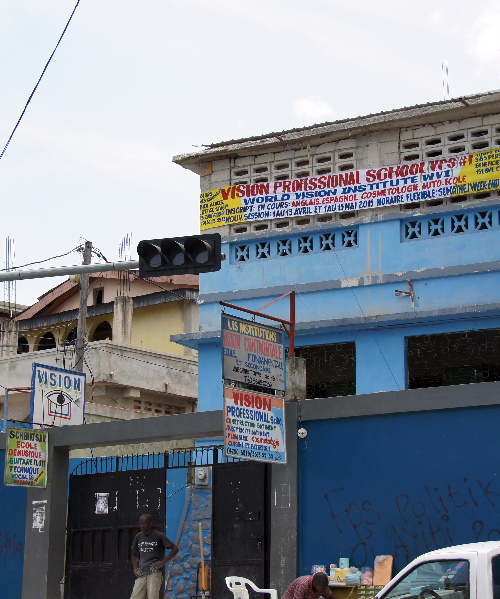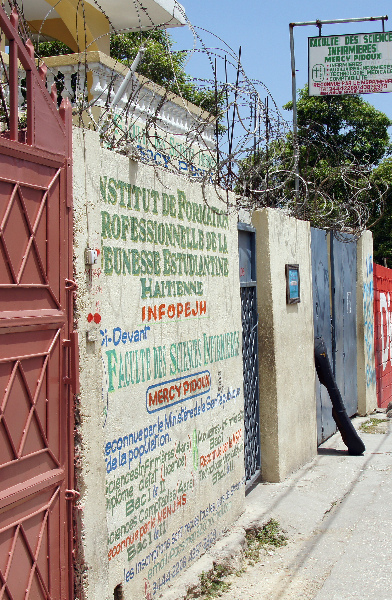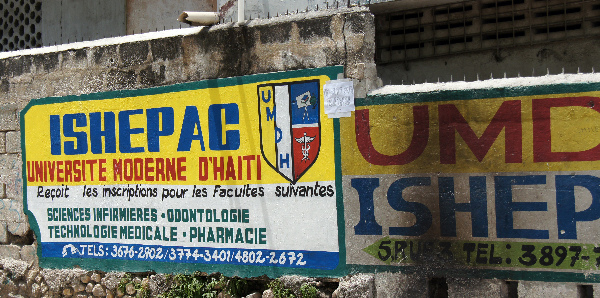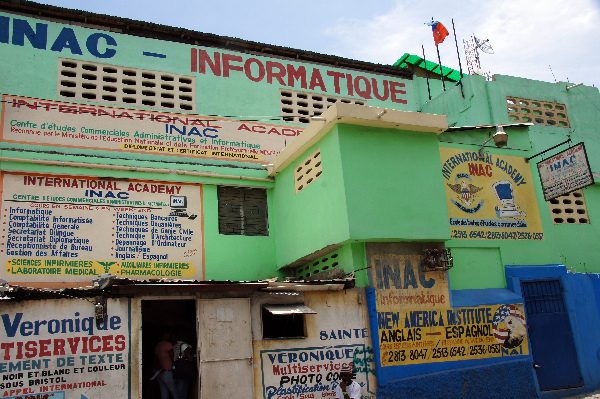For students looking for a dissertation topic in anthropology and education: what about all these schools in Port-au-Prince?

This may have been my second surprise after I landed in Port-au-Prince and took a walk between the Hotel Olufson and the Champs de Mars: what about all these schools? The walk down Rue Capois is about 15 blocks. There are about one school every other block. There are at least as many on the parallel Avenue Christophe and, I found out many many more in the neighborhood southwest of the hotel where I was driven. This area is but a small area of the city and so I have no sense of what is happening, school-wise, in the rest of the city.
A few of these schools are clearly marked as governmental like the Lycee Dessalines. Others are linked to a church. But many more do not appear to be either and they are the ones that fascinate me: who attends? Who organizes? Who set curriculum and pedagogies? Who funds? Who teaches? How are the teachers recruited? When were they set up? How many are being set up? How many fail? How do the students pay? What do the alumni do? Etc.

When need ethnographies of something that should blur further the useless distinction between formal and informal education. These are schools. They must be formal but not quite in the same manner as state school in Euro-America must be. They are also the product of an informal process as various entrepreneurs, and people with little access to government schools, come together they “do school” for purposes that may have little to do with “education”–as one’s skepticism makes one imagine.
While shopping for some souvenir to bring back, I had a brief conversation with a young man in charge of the store. He spoke quite good English (but no French). I asked him where he had learned. He gave me the name of a non-governmental school, affirmed he had learned English in three months and that was all he needed from that school. This made a good story I could not “verify” but it hints at processes that are more akin to those that interest Rancière than to those that interest Bourdieu: if one is to run a tourist business, learning English is essential. This is an intelligence working at education in an altogether “informal” manner, even if it briefly involved a “formal” step (though I am very curious about the pedagogy used in the school!).
Note that someone I met mentioned the number of people in Port-au-Prince that could converse in Portuguese and other languages brought into Haiti by the United Nations. How did they do it?
These, of course, are all very poor people who have lived throughout their lives in the most difficult conditions imaginable (very weak governments, misguided help from NGOs and the “international community,” an earthquake, a cholera epidemic, more misguided help further blurring the lines of governmentality).

So we need more ethnographies. And we need ethnographies from other parts of the world if, as I suspect, Haiti is not unique. Jessica Garber, for example, is doing a pilot project in Phnom-Penh, Cambodia, where she was told there may be thirty “international schools” (for a population of two millions)! I once heard a fascinating paper on “Crazy English” in China. I am sure there are many other examples of the ways human beings around the world are taking their conditions and producing instructional “techniques” (in Mauss’ sense) never before seen by humanity.

They will help us construct further an anthropology of the world at the beginning of the 21st century. My hope, as some of the students I have worked with closely know, is not to stop the analysis with a simple call to “globalisation” or “neo-liberalism.” Labeling epochs by attaching labels to them does do much. Moralizing about greed, the will to power, or desperation does not do much either. We must discipline our own motivations so that we can report on what human beings can do. It will remain the pride of anthropology that it will illustrate what can happen locally when certain forms of governmentality and national sovereignty morph, and thus limit the temptation to over-generalize.
 Print This Post
Print This Post